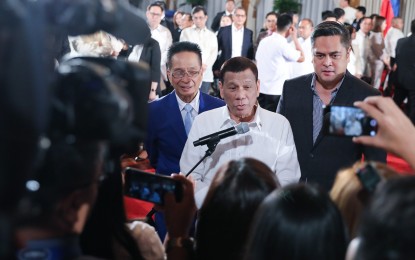
AUSPICIOUS LAW. Photo shows President Rodrigo Duterte granting ambush media interview after an event in Malacanang. Duterte on Wednesday (Sept. 25) signed a law that also protects online and broadcast journalists from baring sources. Malacanang called the law ‘auspicious and relevant’. (File photo)
MANILA -- President Rodrigo Duterte has signed a law expanding the coverage of a law protecting journalists from revealing confidential sources to include broadcast and online journalists.
Duterte signed Republic Act. No. 11458 on Aug. 30 but a copy of the document was made public on Wednesday (Sept. 25).
R.A. 11458 protects journalists from revealing the source of “any news item, report or information appearing or being reported or disseminated” unless the court or Congress “finds that such revelation is demanded by the security of the State.”
The new law amends R.A. 53 better known as the Shield Law or Sotto Law which exempts publisher, editor or reporter of any publication from revealing the source of public news or information obtained in confidence.
R.A. 53 was later amended through R.A. 1477 which only provides protection for publisher, editor, columnist and accredited reporters of print media. It was authored by Sen. Vicente Yap Sotto, the late grandfather of Senate President Vicente Sotto III.
The new law expands protection to “any publisher, owner, or duly recognized or accredited journalist, writer, reporter, contributor, opinion writer, editor, columnist, manager, media practitioner involved in the writing, editing, production, and dissemination of news for mass circulation, of any print, broadcast, wire service organization, or electronic mass media, including cable TV and its variants.”
It is a consolidation of Senate Bill No. 1255 authored by Senate President Sotto and former Sen. Antonio Trillanes IV, and House Bill No. 684 authored by Cebu 1st District Rep. Raul del Mar.
‘Auspicious and relevant’
In a statement, Presidential Spokesperson Salvador Panelo welcomed the signing of the new law as “auspicious and relevant in the present time, with the advent of technology.”
Panelo stressed that Duterte’s signing of the law proves that the President respects and upholds freedom of the press.
“By signing this law, the President has reinforced jurisprudence on the matter which pronounces that, ‘[t]he sanctity of a newsman's source of information is not only intended to protect a newsman but also the source of his information. When a person transmits confidential information to a newsman, he is exercising his freedom of speech on condition of anonymity,’” Panelo said.
“The Palace therefore welcomes this as a manifestation of how the Chief Executive and his Administration respect and uphold the constitutional guarantee on the freedom of the press,” he added.
Panelo pointed out that although the law does not define what constitutes “the security of the State” when journalists are compelled to reveal sources, there are case laws that may be used as guide.
“While the law is silent on what constitutes a security of the State, we believe that we may be guided by pertinent case laws which use the clear and present danger rule to tackle the subject in relation to the constitutional concept of free press,” Panelo said.
The Palace official also emphasized that “there is no hard and fast rule as the obligation to interpret the law as against varying sets of facts always lies with our courts.” (PNA)
